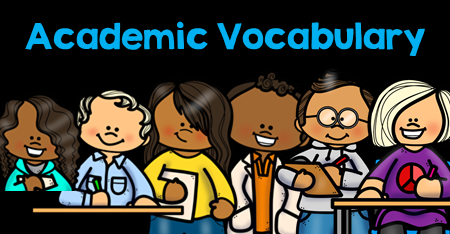 When asked: How do you plan instruction for the diverse learners in your classrooms? A reading certified teacher who has taught for more than 10 years and works with students in grades kinder, first, second, and third grades said the following: “Academic vocabulary is introduced first. Usually, through the lesson objectives for the day (repetition is important). Before the lesson, scan the reading text and underline vocabulary words I think students will struggle with. I will plan my whole group vocabulary instruction and a small group instruction for students who are still struggling with vocabulary words. In the whole group and small group, I model context clues, multiple meaning words, meaning given to the student in the text. Students are given opportunities to read independently with the new vocabulary words acquired.” About 91% of all respondents in my dissertation study said that they teach academic vocabulary. This was exciting to me because, as an experienced teacher, I did not always know how to teach vocabulary, much less academic vocabulary. I define academic vocabulary as words used in academic conversation and text. I have talked about tiers of word in. previous blog, so I can also define academic vocabulary as those tier 2 and tier 3 words that are used by experienced language users. In trainings with teachers, I refer to academic vocabulary as “the language of the standards”. I tend to get on my soap box when talking to early grade educators about academic vocabulary because some of them have expressed the idea that some words are too difficult for students to understand. We repeatedly hear and say the phrase “kid-friendly” language when referencing objective statements and teacher classroom talk. It is truly my belief that any words, ideas, or concepts can be “kid-friendly’ if we teach them. I like to call it incidentally intentional. If you expose children to those words early, those words become words that student own. We can expose children to academic vocabulary, in incidental ways by speaking to our students using academic language. I like to use the example “Okay students make a horizontal fold in your paper, remember, that is like a hot dog bun across the horizon, or long ways…” I would say that while demonstrating the position the paper should be in when making that fold. As another example when stating a lesson objective, I might say: “Today we will be working on manipulating phonemes or changing sounds in words.” I feel it is important for it to be common practice for students to hear words that are new and different as often as possible, but for them to also see how those words are used. We can expose students to academic vocabulary intentionally by letting them see us use academic vocabulary for them in writing just as often as we are saying them. We can do that by using those words in modeled and shared writing opportunities. This allows our students to not only hear new words, but to also see them. That counts as two meaningful exposures to rich new words. It is important to expose children to academic vocabulary early and often. This is a good way to generate and cultivate word consciousness. When children become word conscious, they are less likely to just skip past a word they are not familiar with. We as early grade teachers can create students who are curious about learning new words. One of the ways we can hook them is through using academic vocabulary. Thank you for reading,
0 Comments
|
AuthorPearl Garden, Ed.D has completed her dissertation research involving understanding the vocabulary instruction practices of early grade teachers. She has a passion for the new and novice educator, and it is her goal to help educators tackle the achievement gap with her research findings. She will use this blog to share what she has learned in “pearls of literacy”. The ideas come from her dissertation titled “A Content Analysis of the Vocabulary Instruction Habits by Early Grade Teachers”. Archives
January 2024
Categories |
 RSS Feed
RSS Feed